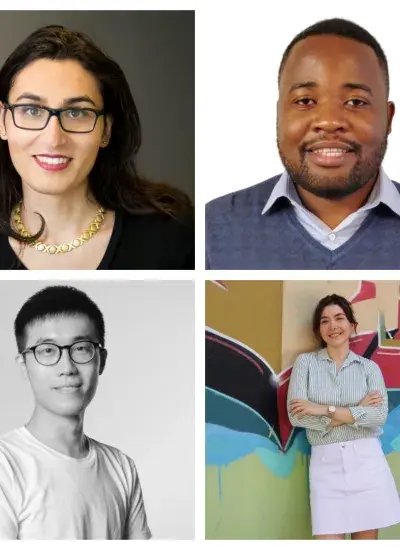HCII Seminar Series - 4 HCII Postdocs

Speaker
Alex Ahmed, Hope Chidziwisano, Qiuyu (Luca) Lu and Deniz Sayar
HCII Postdocs
When
-
Where
Newell-Simon Hall 1305 (Michael Mauldin Auditorium) and via livestream
Video
Video link
Description
The HCII regularly gives our postdocs an opportunity to present during the HCII Speaker Series. This Friday’s seminar will feature four presentations in a hybrid format -- three will be presenting in person in NSH and one will be presenting remotely. If you are available, we hope you will join us in person in NSH. If you can't make it to NSH, the video link to the livestream and recording is below.
Alex Ahmed
Postdoc, faculty advisor Sarah Fox
Title: We Will Not Be Pacified by Participation
Abstract: The basic premise of “participatory design” (PD) is that technology designers should consult with and learn from the eventual users of whatever they are building. To this end, researchers interview people about their experiences using a piece of software and solicit feedback from them. Today, this method is widely used in the technology sector to improve the marketability of products, but the originators of PD had explicitly political intentions: to collaborate with unions and bolster their power in their fight against tech-enabled exploitation by management. I draw from early and contemporary instantiations of participatory methods to show how “participation” and “collaboration” can be wielded as weapons against workers and marginalized people. In these cases, those in power create systems that appear to be an avenue for people to address their concerns, but are ineffectual at best and violent at worst.
Bio: Alex Ahmed is a postdoc at the Human-Computer Interaction Institute at Carnegie Mellon University, advised by Dr. Sarah Fox. Her current research asks questions about technology, labor, and working class struggle.
Hope Chidziwisano
Postdoc, faculty advisors John Zimmerman, Jason Hong, and Sarah Fox
Title: Exploring the Role Sensor-Based Technologies for Homes in Kenya and Malawi
Abstract: Sensor-based technologies have significantly contributed to the design of new applications that improve people’s domestic lives, such as systems for energy monitoring, home surveillance, activity tracking, and air quality monitoring. Even though homes are not the same across the globe, HCI research on domestic technology overwhelmingly take place in industrialized countries. In this talk, Hope will present his research that used technology probes to explore the role of sensor-based technologies for homes in Kenya and Malawi. Generally, his findings suggest that people in Kenya and Malawi are interested to use sensor-based technologies, and they quickly find different ways of appropriating them to suit their needs. Hope will focus on the unexpected ways people used the probes and their reflections on using sensor-based technologies to support domestic activities. He will conclude his presentation with a discussion about the unintended consequences which accompany the deployment of sensor-based technologies in Kenyan and Malawian homes.
Bio: George Hope Chidziwisano is a Presidential Postdoctoral Fellow in the Human Computer Interaction Institute at Carnegie Mellon University. His research focuses on exploring the role of sensor-based technologies for homes in resource constrained settings. More specifically, he conducts design-oriented research in Kenya and Malawi by collaborating with local technicians and families to design, develop, and deploy sensing technologies that have the potential to solve some of the challenges facing homes in Sub-Saharan Africa. Before joining CMU, Hope completed his Ph.D and M.A. in Information and Media at Michigan State University. Hope completed his undergraduate studies in Computer Science and Physics at the University of Malawi.
Qiuyu (Luca) Lu
Postdoc, faculty advisor Lining Yao
Title: Leveraging Fluidic Morphing Matter to Design Novel Interfaces
Abstract: Fluid has no fixed shape, can flexibly redistribute, and yields easily to external pressure. A programmed fluid material can have many unique properties compared to a solid. In this talk, Qiuyu (Luca) will present his work that leverages fluid power for novel interface designing from three dimensions - fluid as the information source, fluid as the actuation medium, and fluid as the morphing display.
Bio: Qiuyu (Luca) Lu holds a Ph.D. in Interaction Design and a B.E. in Mechanical Engineering, both from Tsinghua University. And he was a visiting Ph.D. student in the MIT Media Lab. His research interests span digital fabrication, programmable materials, and interactive art. By blending science and art, technology and design, he devotes himself to exploring the future interfaces and defining corresponding new interaction paradigms.
Deniz Sayar
Postdoc, faculty advisor John Zimmerman
Title: Building Robust Customer-Service Provider Relationships with AI[1]Human Hybrids
Abstract: AI and service innovation has largely focused on cost savings based on automation and delivering personalization directly to customers. This work particularly focuses on the interpersonal interactions (co-creation opportunities) that occur between frontline service employees and customers and AI's possible enhancing impacts. With AI informational support, employees can both personalize their service performance to individual customers and make customers feel that the brand/service is making an effort on the customer’s behalf. Drawing upon literature on interpersonal relationships, automation and augmentation, value co-creation, and AI in services, several collaboration models between service employees and AI are proposed.
Bio: Deniz Sayar received her BID degree from the Middle East Technical University (METU) and her PhD at Istanbul Technical University (ITU). Her research interests cover AI in services and digitally enabled business model innovation. Part of her PhD research was conducted at Lancaster University’s Imagination Design Lab, UK. She is currently a Fulbright Postdoctoral Visitor at the HCI Institute, working on the intersections between AI and value co-creation.

